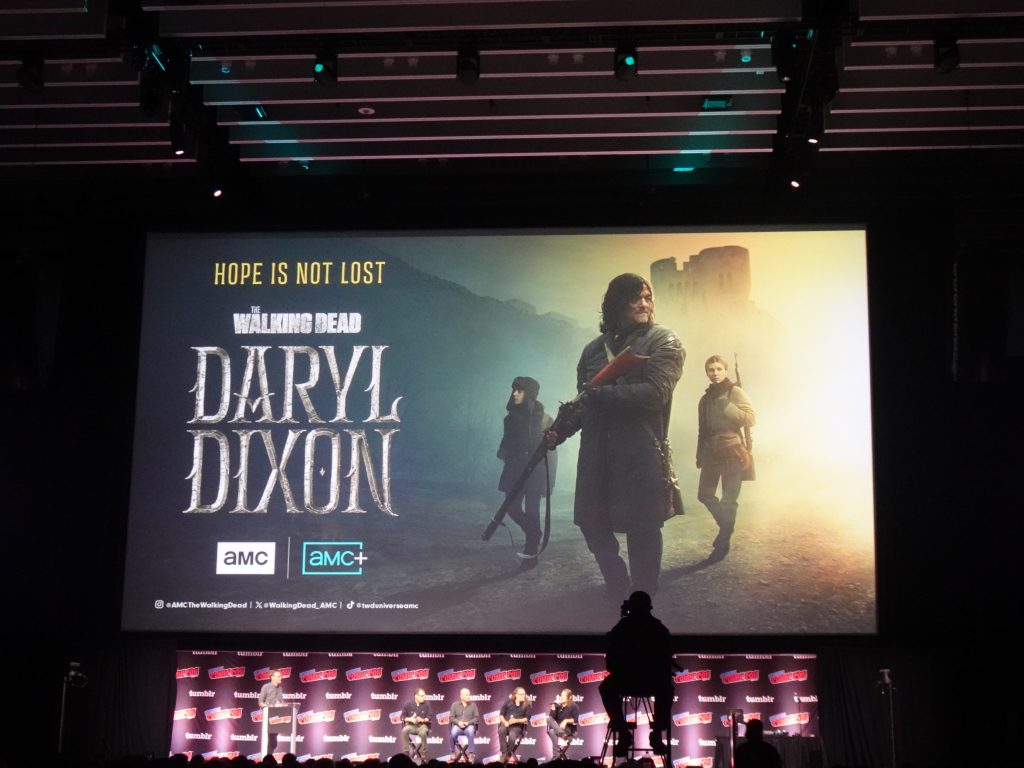
It’s just about time to wrap-up my New York Comic Con (NYCC) coverage and to do that I’m focusing on one of the yearly comic con favorites – AMC’s The Walking Dead: Daryl Dixon.
Unlike other shows which because of the SAG strike actors could not attend to talk about their content AMC has worked an interim agreement with SAG which allowed them to continue filming during the ongoing SAG strike as well as have actors promote the content. Therefore while Chief Content Officer of the Walking Dead Universe Scott M. Gimple, Showrunner David Zabel, and Executive Producer Greg Nicotero were on hand to discuss the show so was Norman Reedus where he was able to share his experience not just as Executive Producer but for playing show lead Daryl Dixon as well. While Norman Reedus was the only actor to come out on stage this does make sense as this was a show focused on his charater. In addition to Reedus, the series stars Clémence Poésy, Adam Nagaitis, Anne Charrier, Eriq Ebouaney, Laika Blanc Francard, Romain Levi and Louis Puech Scigliuzzi and is executive produced by Scott M. Gimple, Showrunner David Zabel, Reedus, Greg Nicotero, Angela Kang, Brian Bockrath, Jason Richman and Daniel Percival.
In The Walking Dead: Daryl Dixon, Daryl (Noman Reedus) washes ashore in France and struggles to piece together how he got there and why. The series tracks his journey across a broken but resilient France as he hopes to find a way back home. As he makes the journey, though, the connections he forms along the way complicate his ultimate plan.
Panel
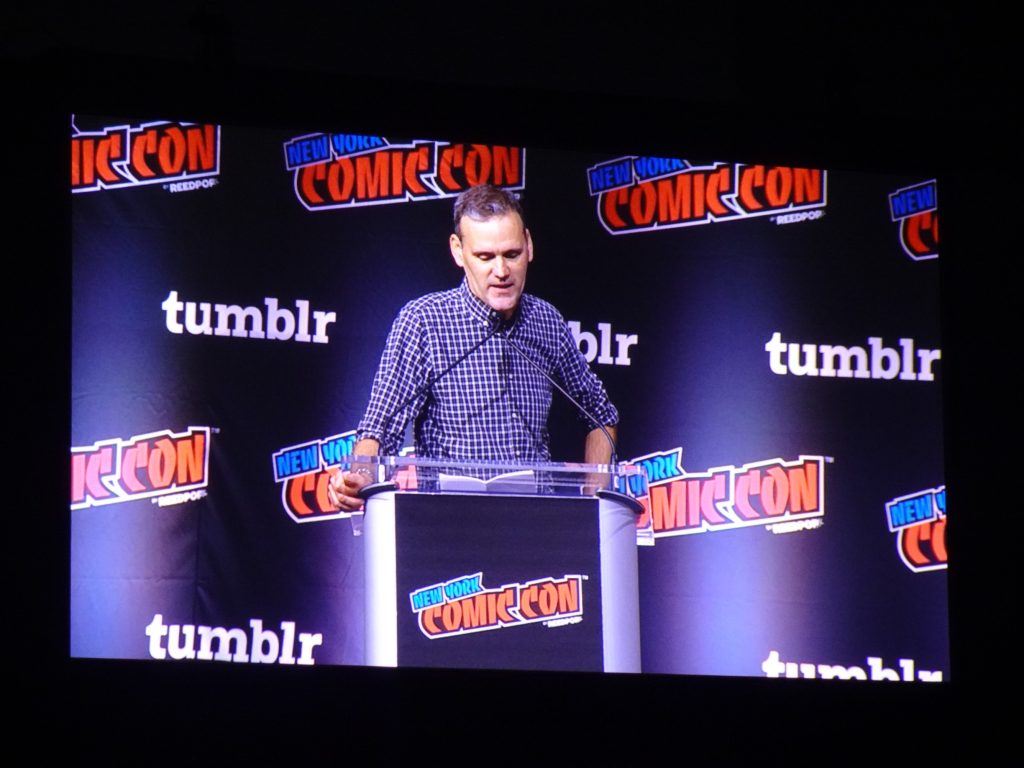
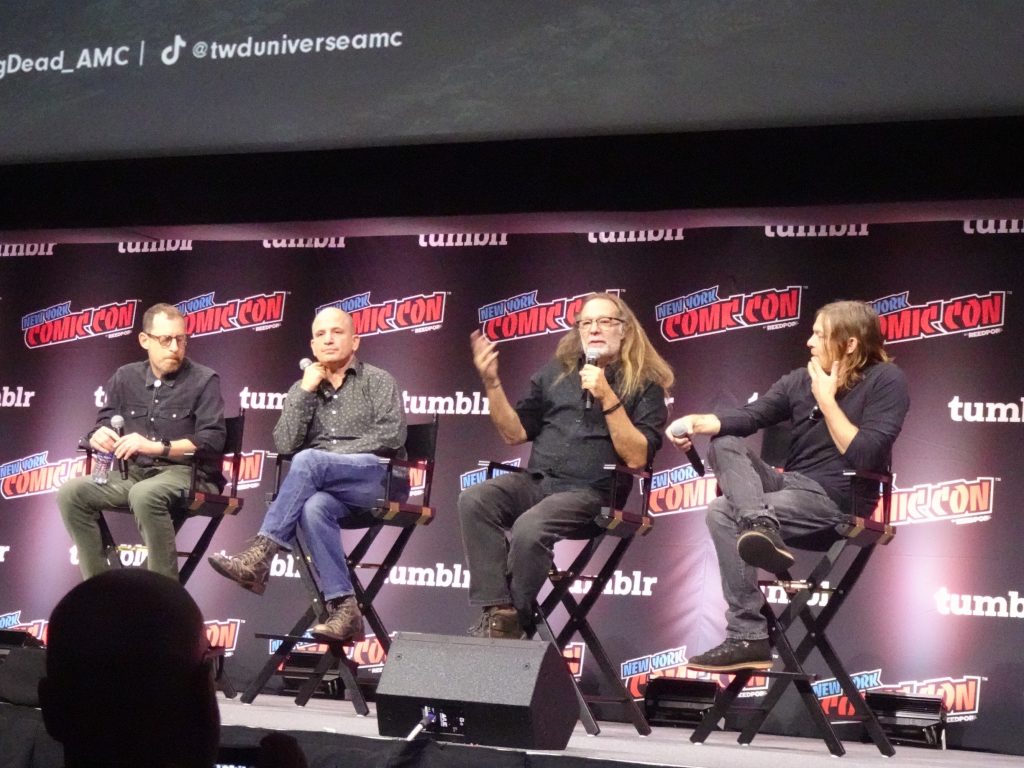
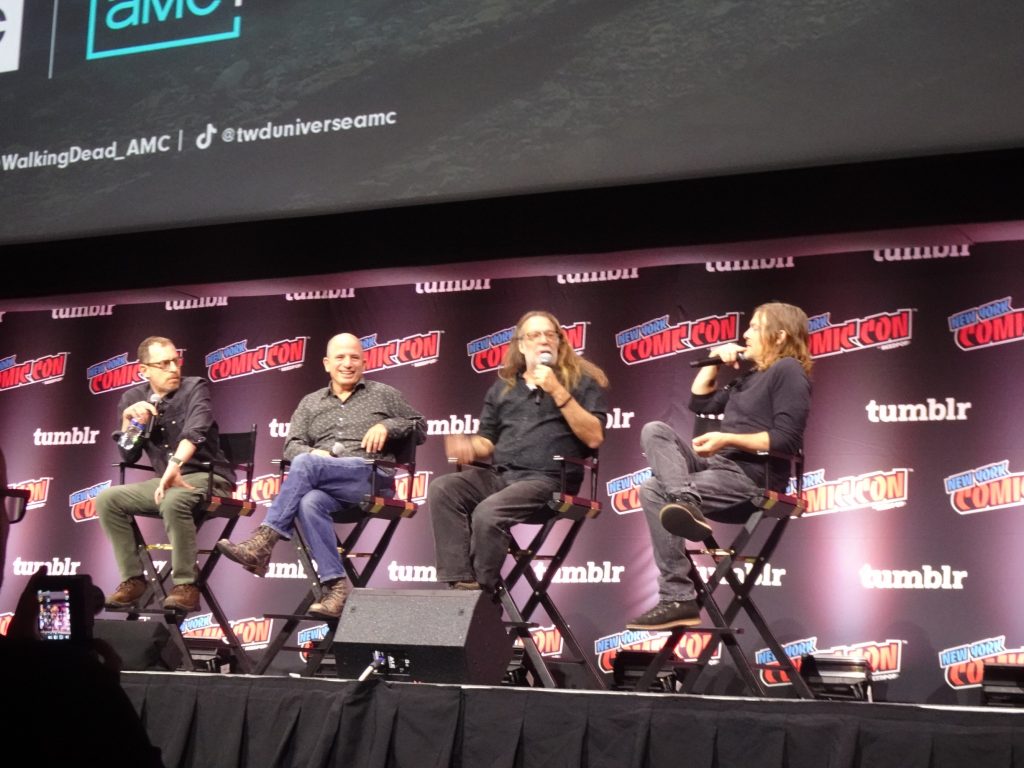
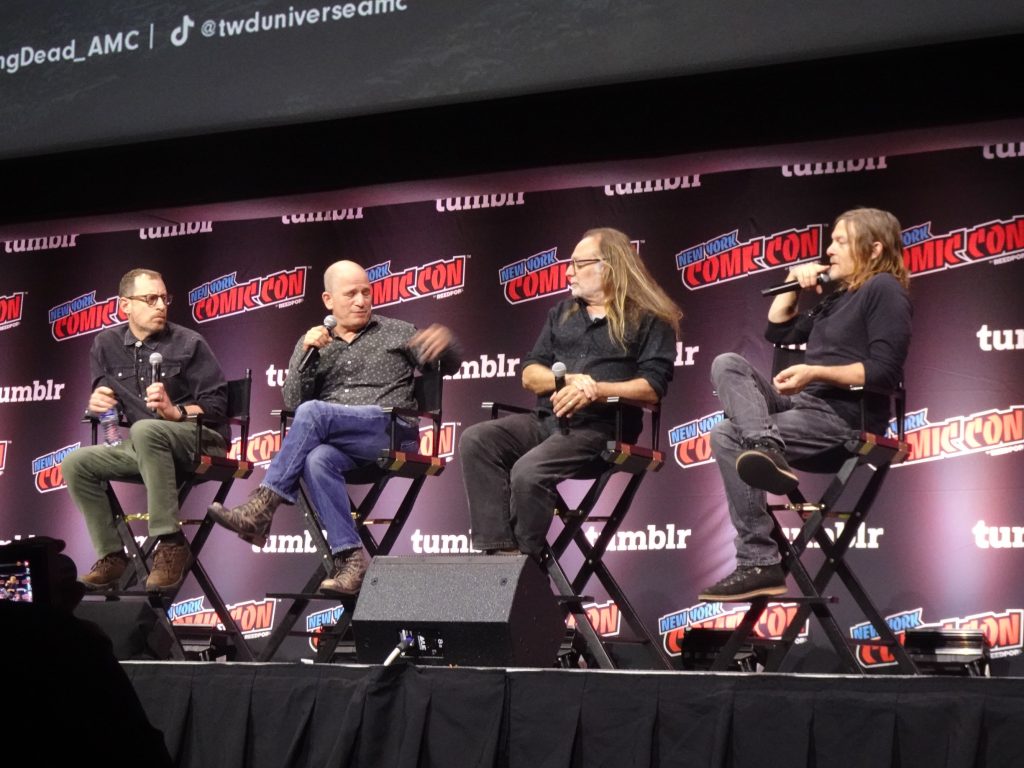
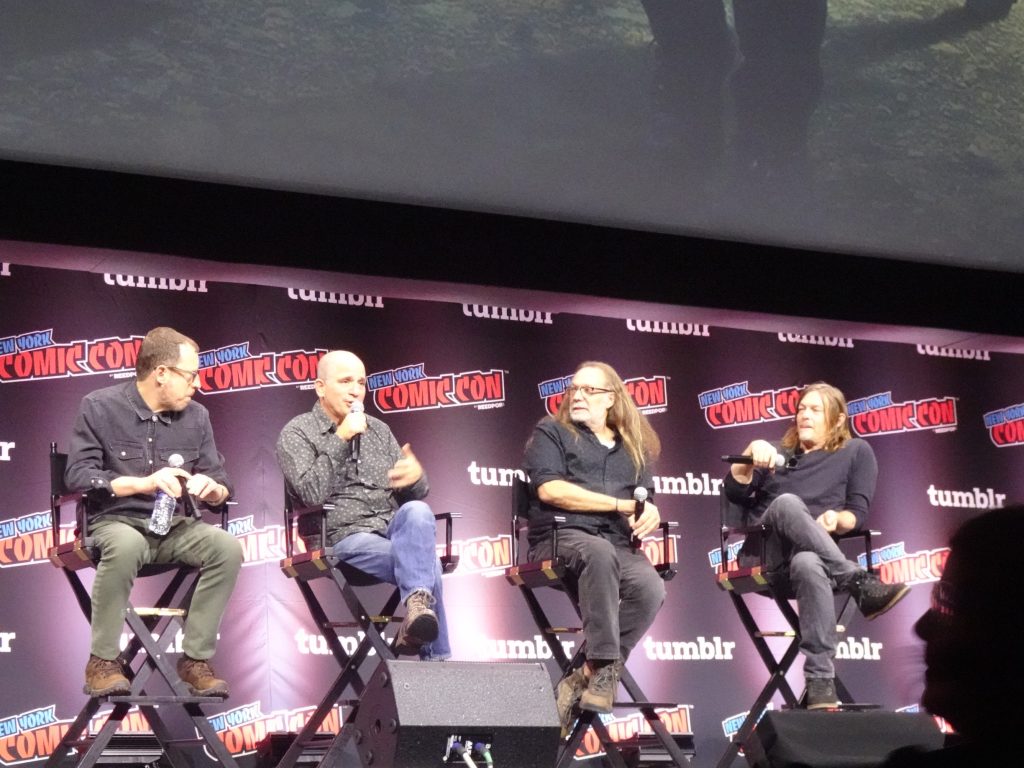
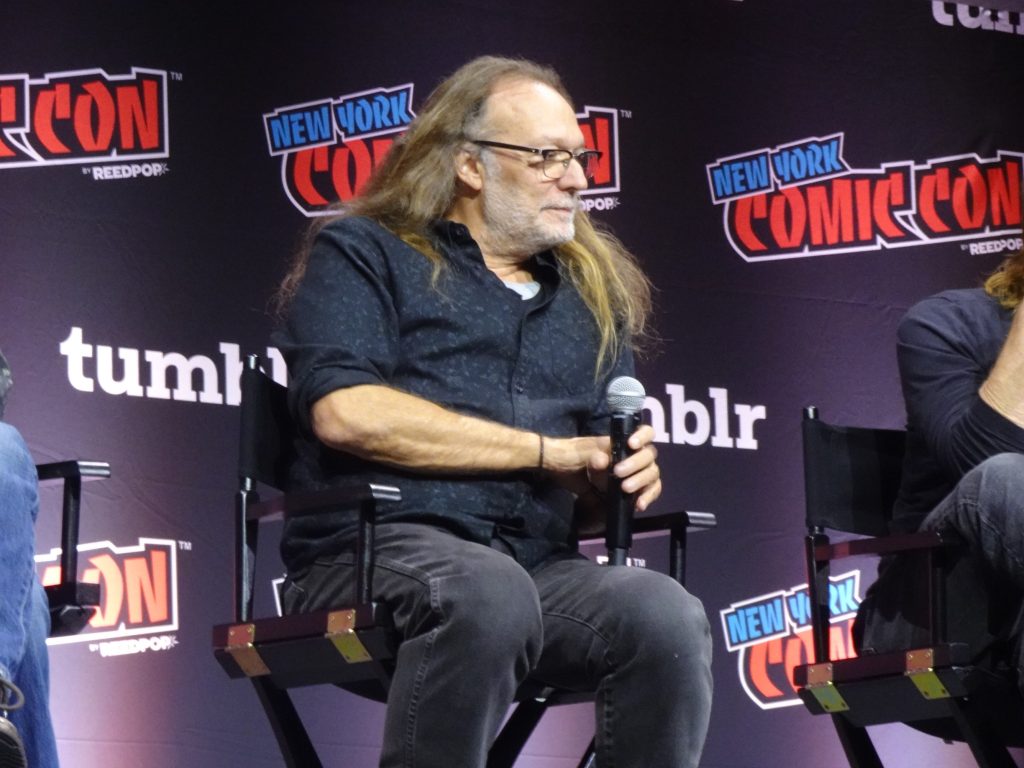
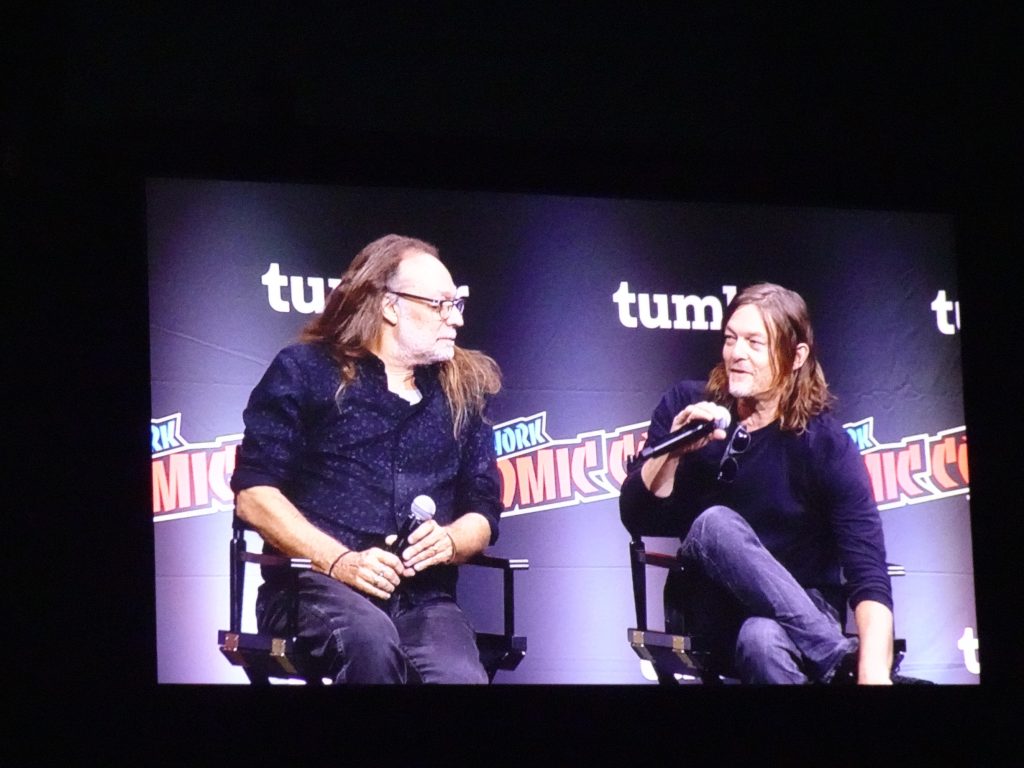
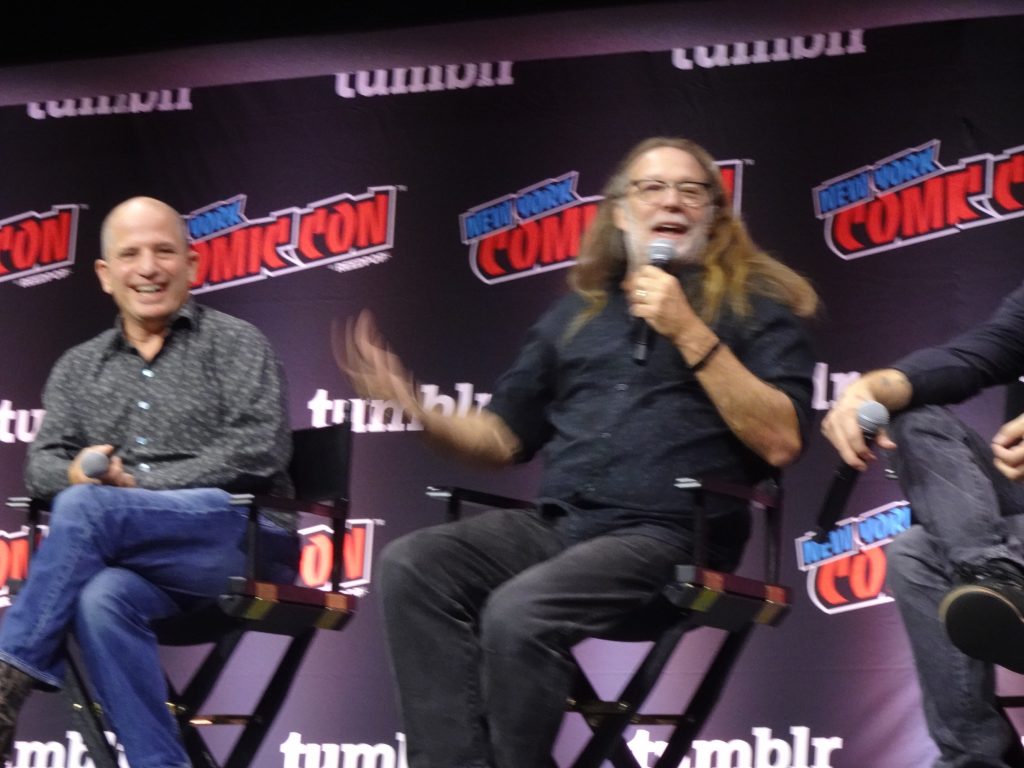
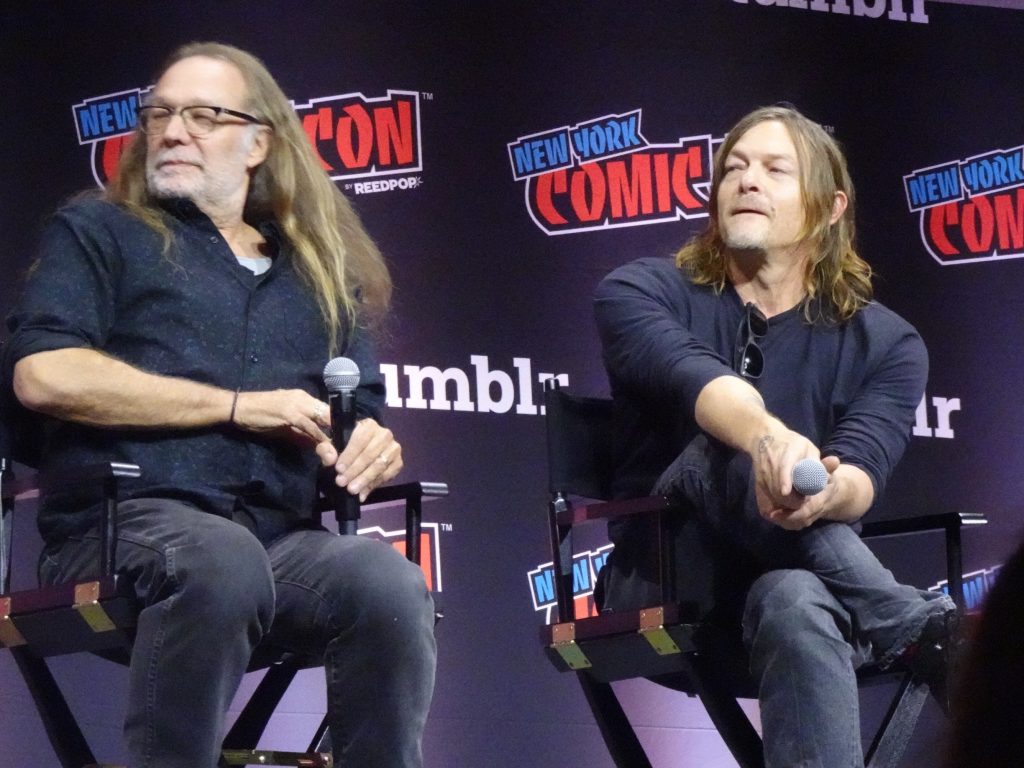
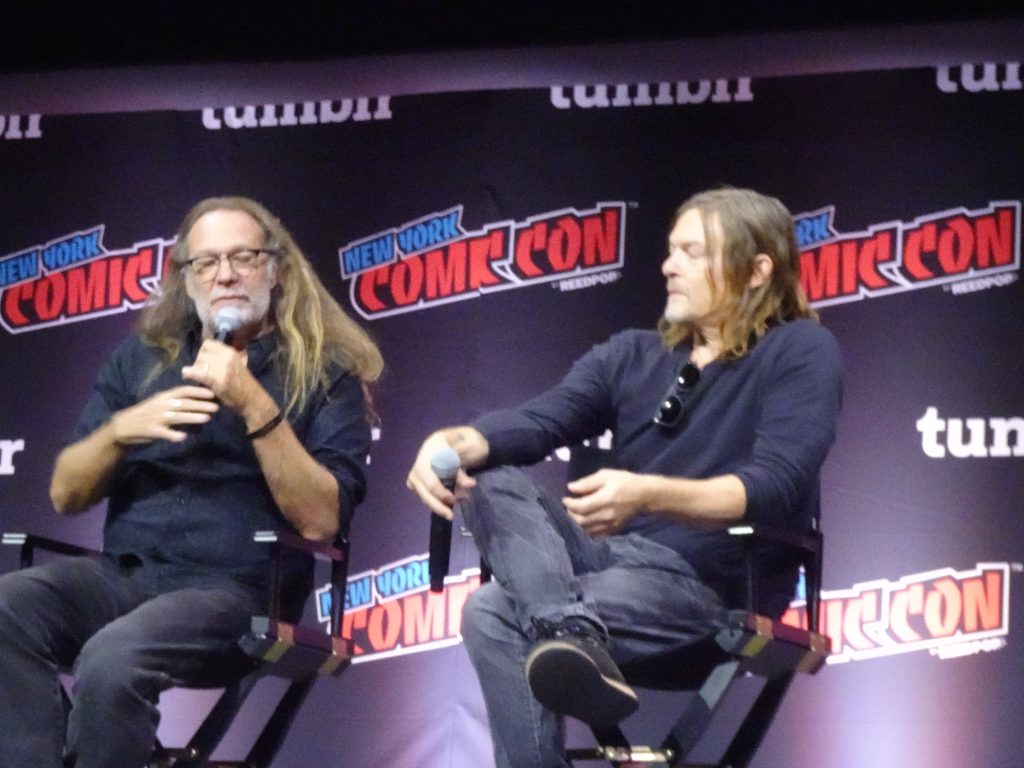
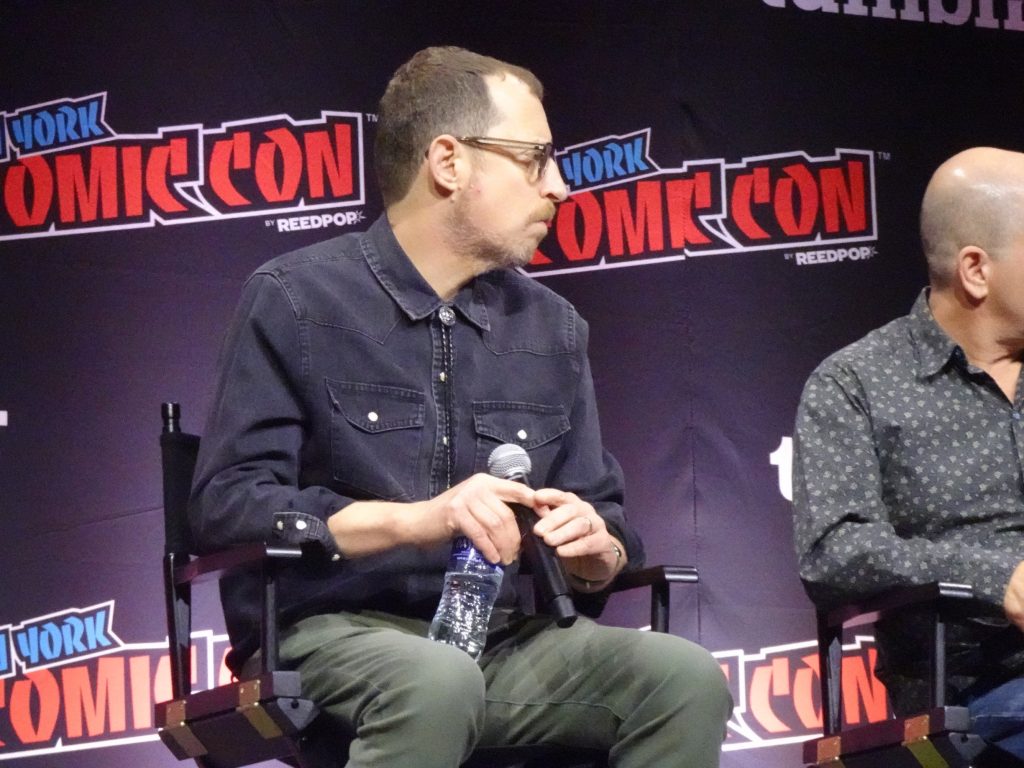
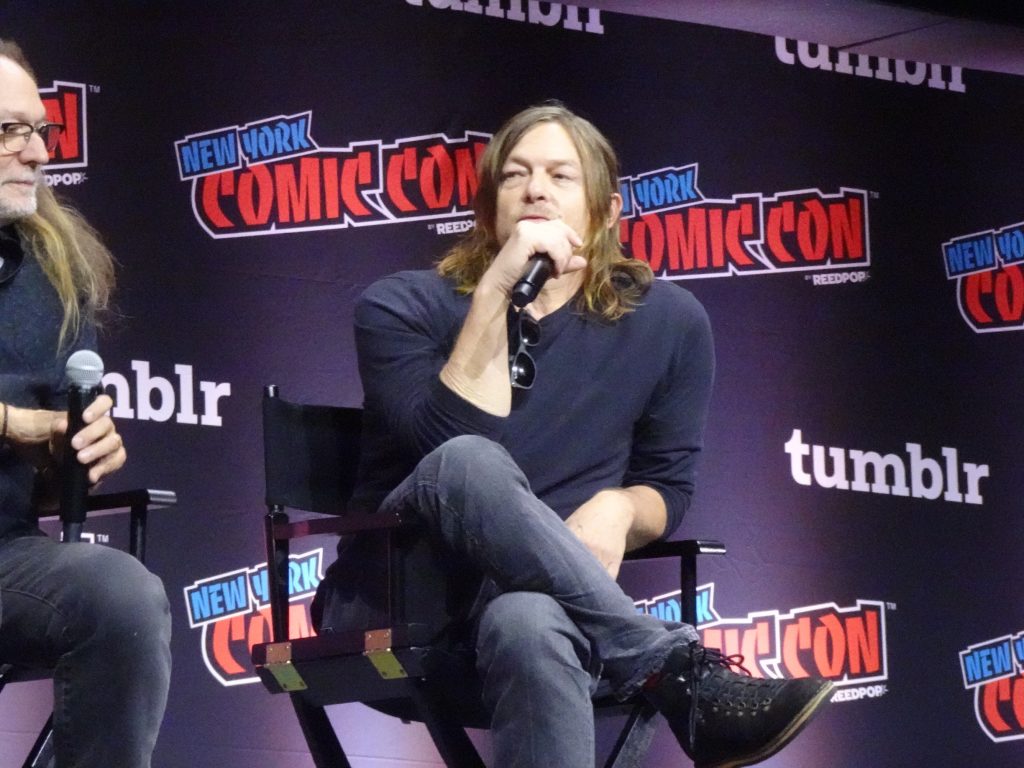
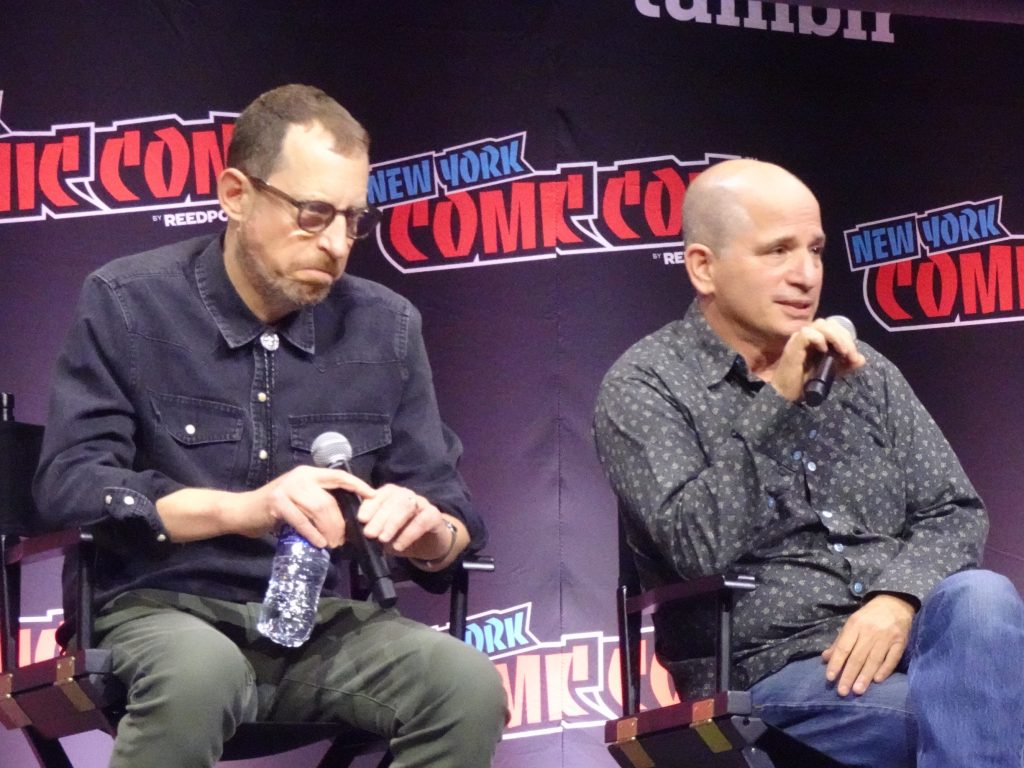
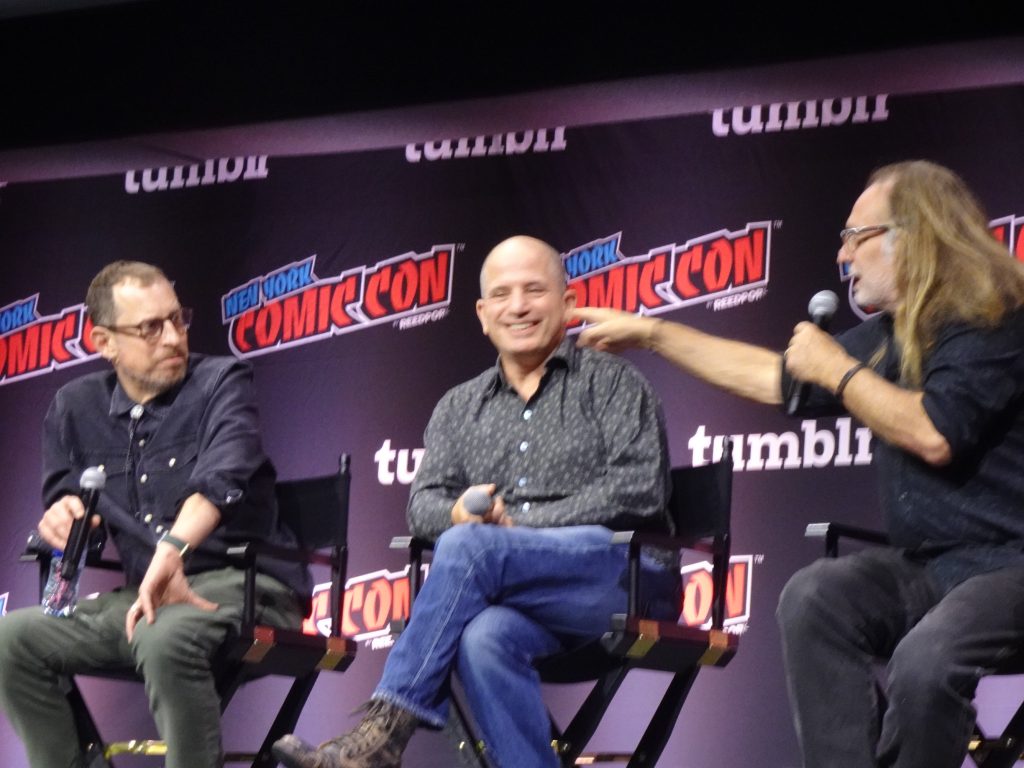
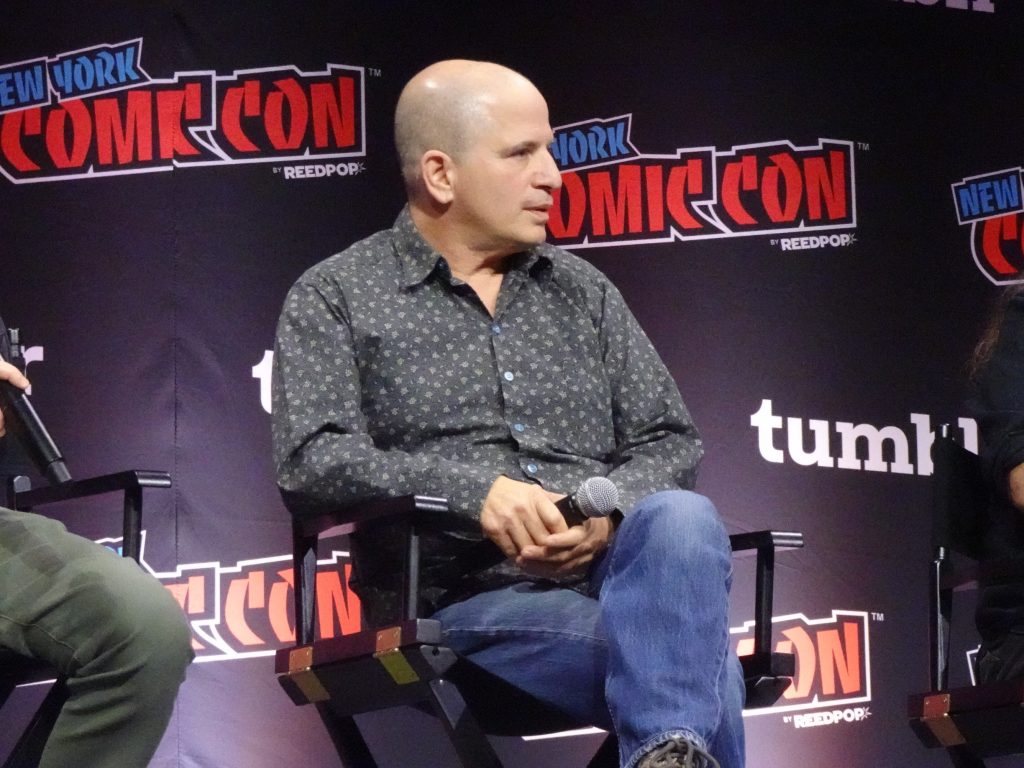
AMC Networks returned to New York Comic Con with a The Walking Dead: Daryl Dixon panel, along with the panel the entire Season One finale was screened to the crowd. Following the screening, which was moderated by Entertainment Weekly’s Dalton Ross, there was a Q&A with Chief Content Officer of the Walking Dead Universe Scott M. Gimple, Showrunner David Zabel and Executive Producer Greg Nicotero and Executive Producer and Lead Norman Reedus.
Not going too much into a recap/review of the season finale but we did learn some important discoveries such as how Daryl ended up in France as well as his family history Normandy. The season finale really does put a question in Daryl’s mind for season two as he will definitely need to explore what family really means to him as he has connections back home but has learned to feel connected to these new people. Only time will tell how this goes and what happens when he runs into people from his past.
As the first season ended with a cameo from Carol (Melissa McBride) looking for Daryl it was no big surprise but it was confirmed that Melissa McBride will be a series regular in the second season of The Walking Dead: Daryl Dixon which is currently in production in France and is set to premiere in 2024. The second season also stars Norman Reedus, Clémence Poésy, Louis Puech Scigliuzzi, Laika Blanc Francard, Anne Charrier, Romain Levi and Eriq Ebouaney and is executive produced by showrunner David Zabel, Scott M. Gimple, Reedus, McBride, Greg Nicotero, Angela Kang, Brian Bockrath, Daniel Percival, Jason Richman and Steve Squillante.
In a press release Melissa McBride noted: “I’ve known there was much more to be told of Carol’s story as I felt her so unsettled when we last saw her, as she watched her best friend, Daryl, ride away. Apart or (hopefully!) together, their stories run deep, and I’m so excited to continue Carol’s journey here. This team of storytellers have done amazing work to land these two established characters in an entirely new world to them, and I’m loving the discoveries!”
Interviews
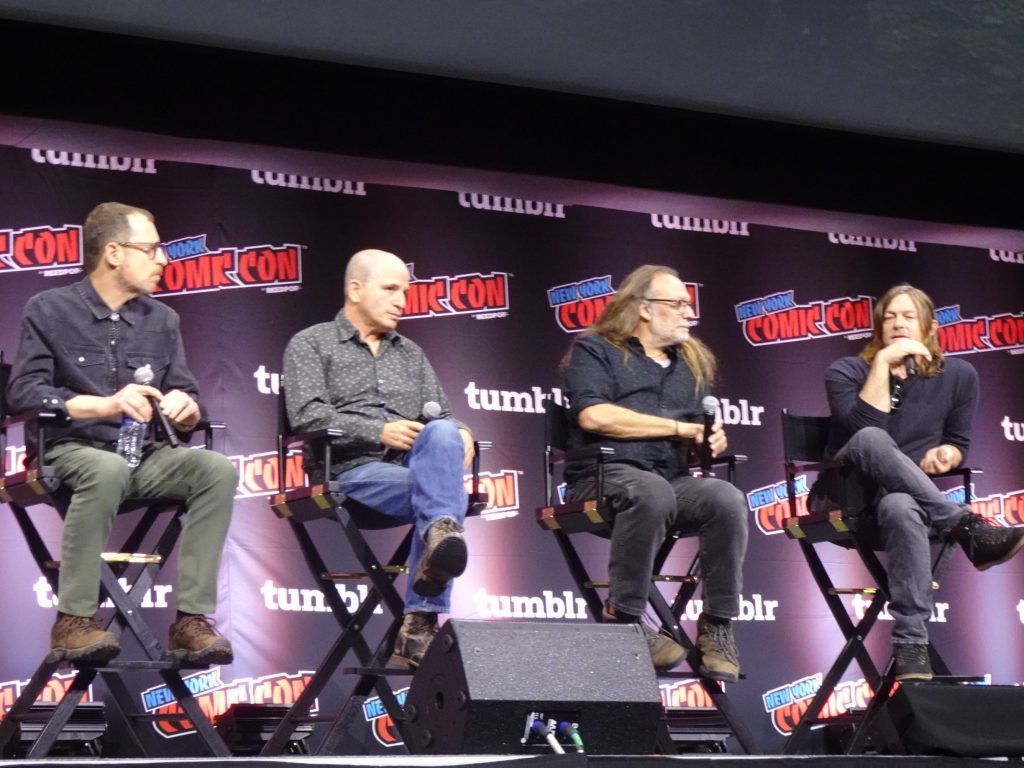
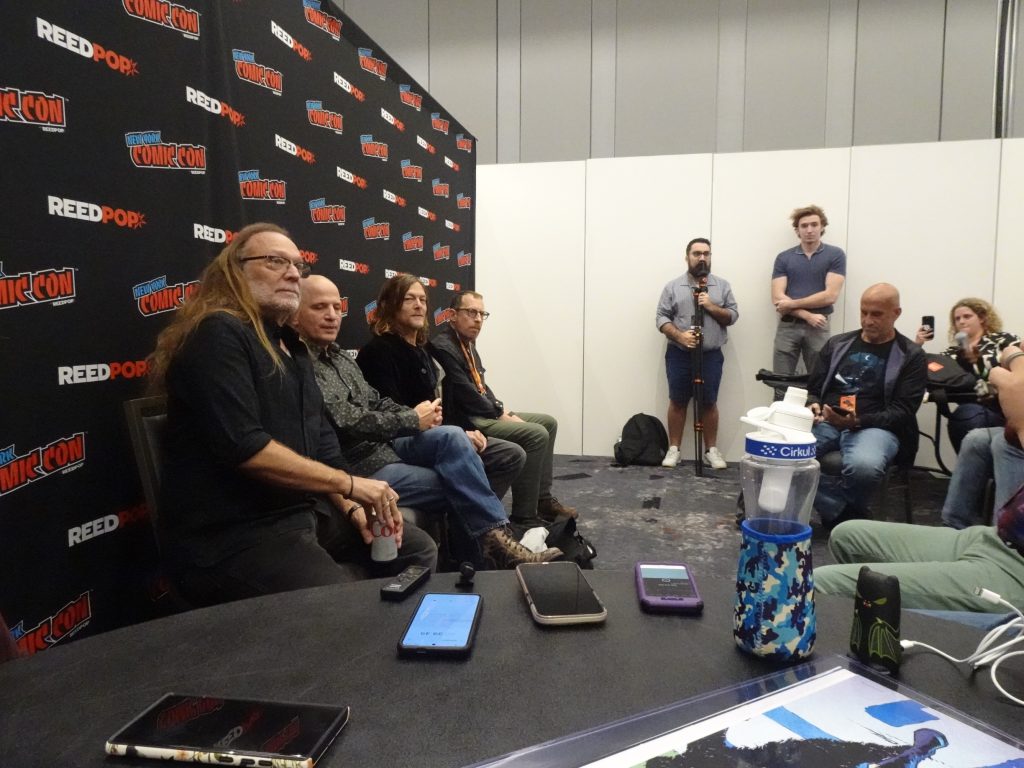
After the panel the panelists provided a press conference for media to discuss even more topics not discussed during the panel. Hi-Def Ninja was able to attend the press interview and get some more insight into The Walking Dead: Daryl Dixon and learn some new things about the planned second season. Since the season finale has aired there were a few topics that were discussed in the interviews which I feel are now OK to keep in the interviews,
Q: How does Daryl define home at this point and will he ever be okay in one place or does he always have to be out?
NR: Home is where the heart is, his heart is just being pulled in France. He started to care for these people, he’s kind of one of those Billy Jack/Kung-Fu type of characters, movies even TV shows I loved as a kid, with one guy on a solo journey. Even on the flagship show he would take off and do his own thing. I think he’s torn, that’s the story we’re telling… A lot with Melissa too, a lot with that character I feel that somethings wrong. They have that kind of bond that there’s a lot of unspoken things that were said. I’m hoping that the bonds that we made in that flagship show are still very strong so she can take care of herself of course but doing a show that you’ve been doing for this many years the bonds just going to get stronger and stronger. So he wants to go home but he can’t leave it like it is, its just not the time to turn the other cheek.
Q: In the flagship show there’s a lot history; we’ve witnessed communities built up, destroyed, and re-built up again but in this show the main character was dropped into France which already has it’s own culture, society, and set of rules. How did you go about creating this for the show.
DZ: My attitude was that we didn’t have to have all of the same exact conditions as in the American version of the apocalypse. Just like pandemic hit and affect different areas in different ways so there are some subtle little differences although it’s consistent in what Walking Dead posits as sort of the rules and the way things work. But in terms of coming up with the groups it was informed by a lot of things but it was really starting by saying what will make this specific to France. What will make this feel like this is a show that could only happen in France and that is informed by France without resorting to cliché. So that was part of the reason for making it a journey story of Daryl traveling across all of France not just standing in front of the Eiffel tower. Like let’s see the Southern France and let’s see Northern France and that also led me to the other two big elements that I think that answer your question; one of which was the history of French Catholicism and that connected to my feeling that I wanted to find a lot of hope in the show. I wanted to find pockets of hope; there’s clearly darkness, it’s a dark world but I felt like that was an opportunity to find more hope and then also some of the World War 2 references which you see throughout the show and the connection between the United States and France historically and how could we sort of conjure things that that relate to that relationship that also affect his as a character. So that led to the idea of a resistance group and a sort of neo-fascist group and then also the connection ultimately of Daryl through the childhood that we’ve already heard about in The Walking Dead and connecting another dot to that which is the story of the grandfather who died on the beach in Normandy.
GN: It’s pretty fascinating too because standing on that beach takes your breath away. It’s powerful when you think about the sacrifices that people made for somebody that they didn’t even know, they didn’t even know these people and the grandfather’s, husbands, and sons that died it’s palpable and we were fortunate enough to really be able to experience so much about the culture in France. When I landed we went on scouts and we went to Marseilles and we went all the way through Léon and all over the place but I remember reading the script for episode six and of having Daryl on the beach and everything that’s signified in that moment of Daryl looking at the grave is understanding the sacrifices that you make for people that use don’t even know or that you barely know and I think that that moment, I was even telling Norman, just his performance in that moment really tells the entire story of what it’s like for that character to be in France and how it affects him.
DZ: I think we were all affected and Norman said the same thing by being in all those real places. So it’s rare that you’d write a show like this that has an incredible array of locations and places that we’re going and just every time we’re in the real place. It affects everybody in the company and that affect Daryl when he’s standing looking at his grandfather’s grave and he knows that’s what the American soldiers actually land.
NR: It was haunting. Erik had a really good line when we were shooting in the catacombs. What was the line?
DZ: He says “America is an infant we’ve been through hundreds of years on apocalypses; we’ll get through this one” referring to all the bodies in the catacombs and that is the difference too the idea of the historical memory of being in France and the cultural influence that’s something we can do in France that you couldn’t do in an American version of the show cause America’s an infant and these countries in Europe have been there for hundreds and thousands of years and been through lots of other stuff.
Q: We saw many places in France. What were the steps to secure these locations? And how far along are you into season two?
DZ: We’re about halfway through season 2. We’ve done most of the 3 episodes and plans for 3 more. And on locations it’s very it’s tricky and in France it works a little differently than it works here but what was required was a lot of advanced time. So we had to know what we were going to do long in advance so Mont Saint-Michel for example is location I never thought we would actually be able to shoot in. I went there with the location manager, we schmoozed the mayor, we schmoozed the head of security and they let us come and then because we behaved well they let us come back so that we can continue to shoot in and around Mont Saint-Michel. The catacombs was an incredibly hard place to shoot but I just felt like we wanted to go to the real catacombs and be able to say like we’ve been in the catacombs but it was a very challenging place because of the space and the air and all kinds of things. So there were a lot of challenges that were exciting to get through because once we’re in those places it mattered a lot but you have to be very careful in a lot of locations. When we were in the Abbey at the beginning, when we’re in any religious site, when we’re in the cemetery lots of things you have to be very careful about and in France their even stricter about some of that stuff then we are here in my experience at least. So we had to be very cautious.
GN: If you’re talking about an Abbey that’s centuries-old you can’t pour fake blood on the ground. So we had to do a lot of advanced recon and a lot of these places like Mont Saint-Michel can’t be closed. So there’ll be tourists on one little street over here and then we’re shooting-up on this street and there were a couple shots we did where there were people walking on the sand flats outside and you can’t tell them we’re filming. So we would have to go in and digitally remove them.
DZ: The hardest one actually I forgot was the beginning when we had to get the metro train, in the flashback, for Episode 2 when Isabelle down on the metro track and a train goes by and the walkers are killing people inside and that was a huge thing, very difficult, they didn’t want any walkers anywhere in or near the train. Eventually we got them to allow us to have walkers in the train but the walkers can’t actually bite anyone in the train, we couldn’t put blood in the train, we couldn’t have a Walker engineer of the train so that is why you see nobody driving the train and things like that that were very long conversations going back-and-forth back-and-forth. Every time I thought it wouldn’t work and most of the time it worked and it was always worth it.
NR: Touching on that a little bit, what I always thought was so beautiful about The Walking Dead and what we did in Georgia was that it wasn’t our show it was everyone’s show, it felt like everyone’s. It started little and it got bigger and bigger with the fans of the show and it always felt like it belonged to everybody and us going to France it was really important to us not to do an American bastardized tourist version in France, everyone has a brie wheel, a poodle, and a beret. We wanted the French people to feel it’s their show as well and we wanted it to be authentic and we had French writers, there are little French jokes in there that only French people know. We fought to have a lot of the dialogue still in French and not subtitled.
DZ: We were striving for as much authenticity as we could all the way through and we won a lot of those battles and I think the three of us were kind of leading the pack there. We are all kind of open, comfortable, so ingraining ourselves culturally in France and letting that feed into the show too. I was really worried about what you just said. I was really worried about the tourist version of the show and that was part of the reason we fought about how much French language there would be. But they were super appreciative that we didn’t just make all the French people speak English. I had more than one actor, including Clémence who plays Isabelle, say ‘I can’t believe how much French they’re letting you put in the show.’Q: Can you walk us through the timeline for getting Melissa on board to come back or was this always the plan for her?
NR: She was on board from before the first episode.
DZ: From the time I started that was always the plan and I was super psyched about it although it was a secret I kept in my pocket for a long time but we were always building to a second season that included Melissa.
Q: What are your thoughts on this franchise and where it is right now?
SG: This has been about a third wave and it’s been about making very distinct shows like Dead City and Daryl Dixon both have very strong characters and they still have the same story values and that has everything to do with Norman, Jeffrey, Lauren but then we try to counter that with amazing new stuff and new voices telling those stories. So I think this has been a really good year. Before we were doing shows that complimented The Walking Dead in a lot of ways and this is doing shows that are very distinct. We have the last few episodes of Fear the Walking Dead coming out and those couldn’t be any more different than this. It’s been a really good year.
Other Upcoming AMC Shows
At the Panel AMC teased a few of their other upcoming shows including The Walking Dead: The Ones Who Live, Anne Rice’s Interview with the Vampire Season 2, and Orphan Black: Echos
The Walking Dead: The Ones Who Live
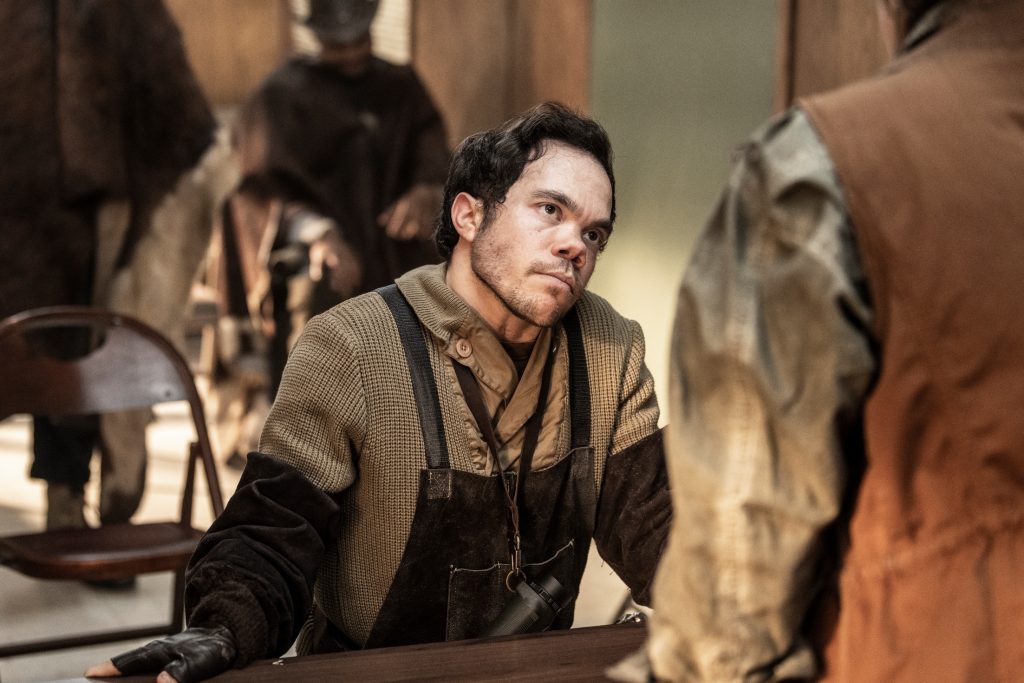
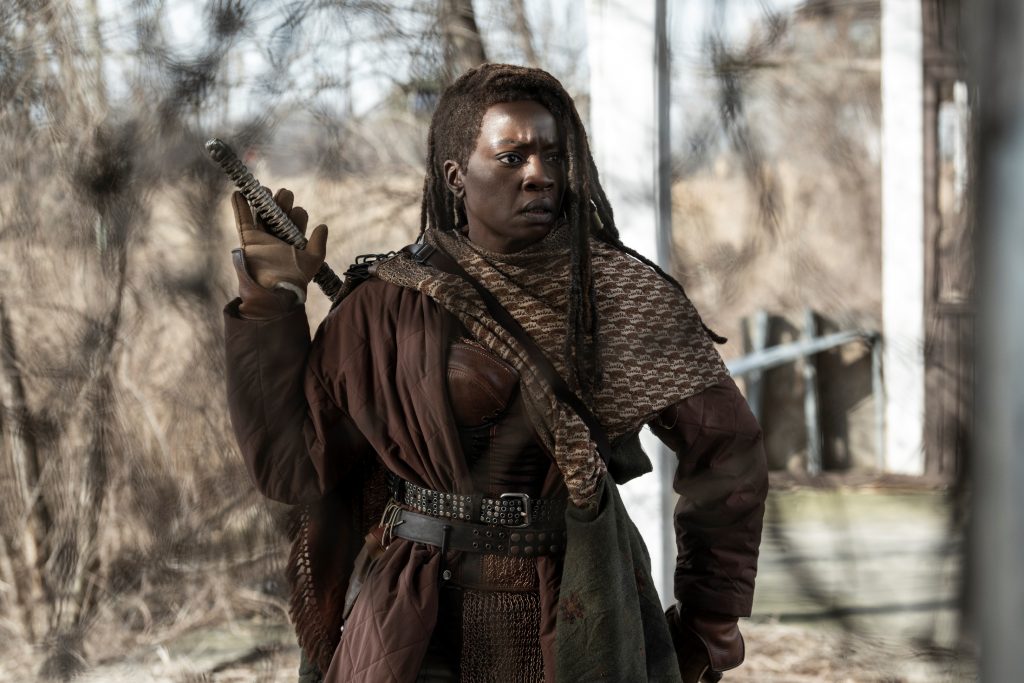
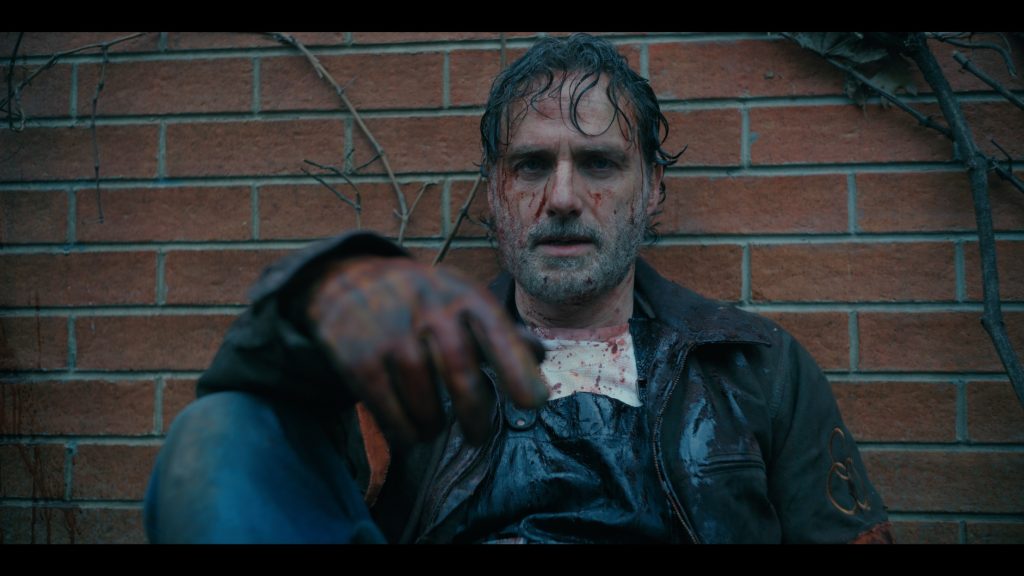
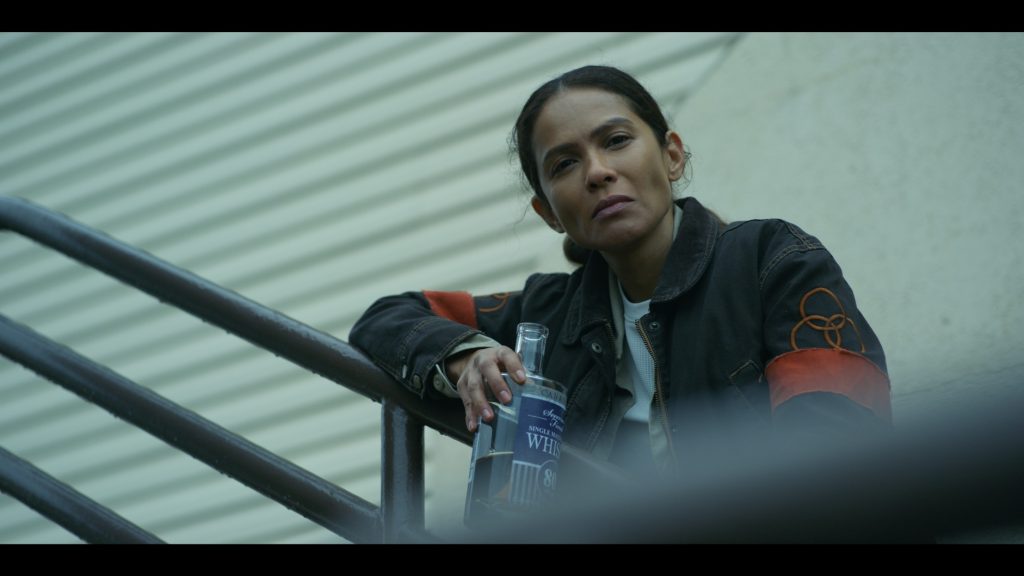
The Walking Dead: The Ones Who Live presents an epic love story of two characters changed by a changed world. Kept apart by distance. By an unstoppable power. By the ghosts of who they were. Rick and Michonne are thrown into another world, built on a war against the dead… And ultimately, a war against the living. Can they find each other and who they were in a place and situation unlike any they’ve ever known before? Are they enemies? Lovers? Victims? Victors??Without each other, are they even alive — or will they find that they, too, are the Walking Dead?
The Walking Dead: The Ones Who Live stars Andrew Lincoln and Danai Gurira, Pollyanna McIntosh, Terry O’Quinn, Matt Jeffries, and Lesley-Ann Brandt. Scott M. Gimple, Chief Content Officer of The Walking Dead Universe, serves as showrunner and executive producer alongside Lincoln, Gurira, Denise Huth and Brian Bockrath.
The Walking Dead: The Ones Who Live premiers February 2024.
Anne Rice’s Interview with the Vampire Season 2
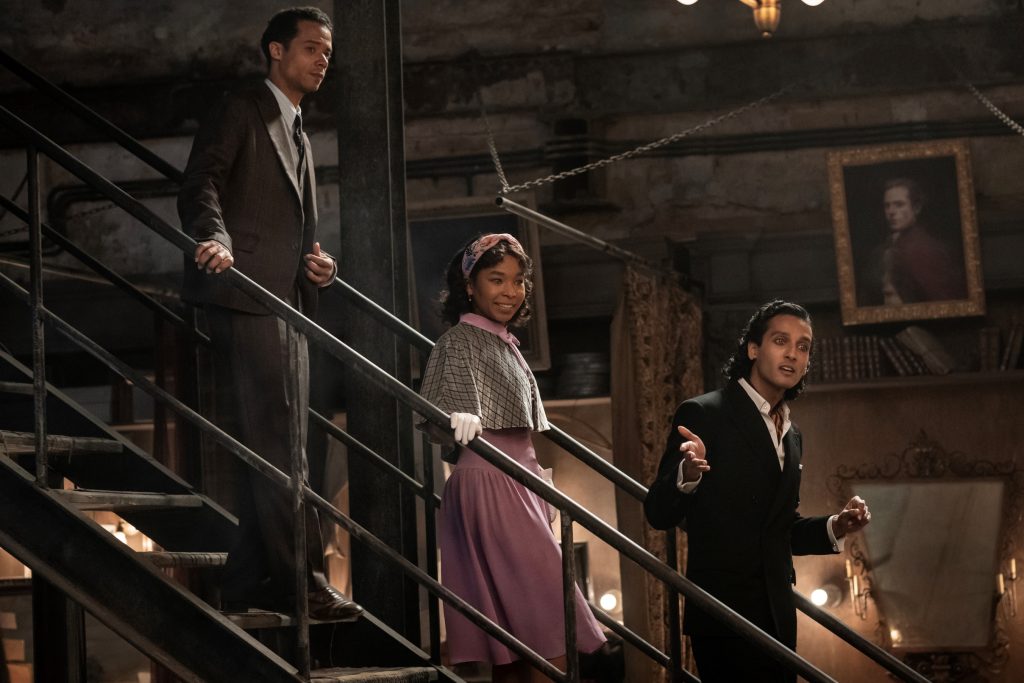
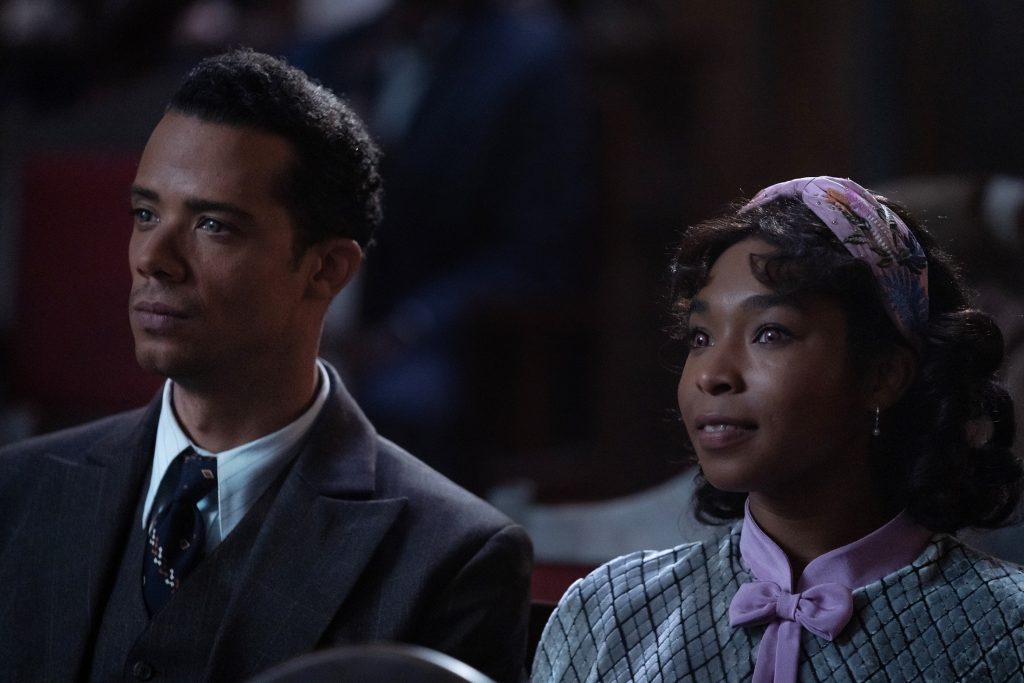
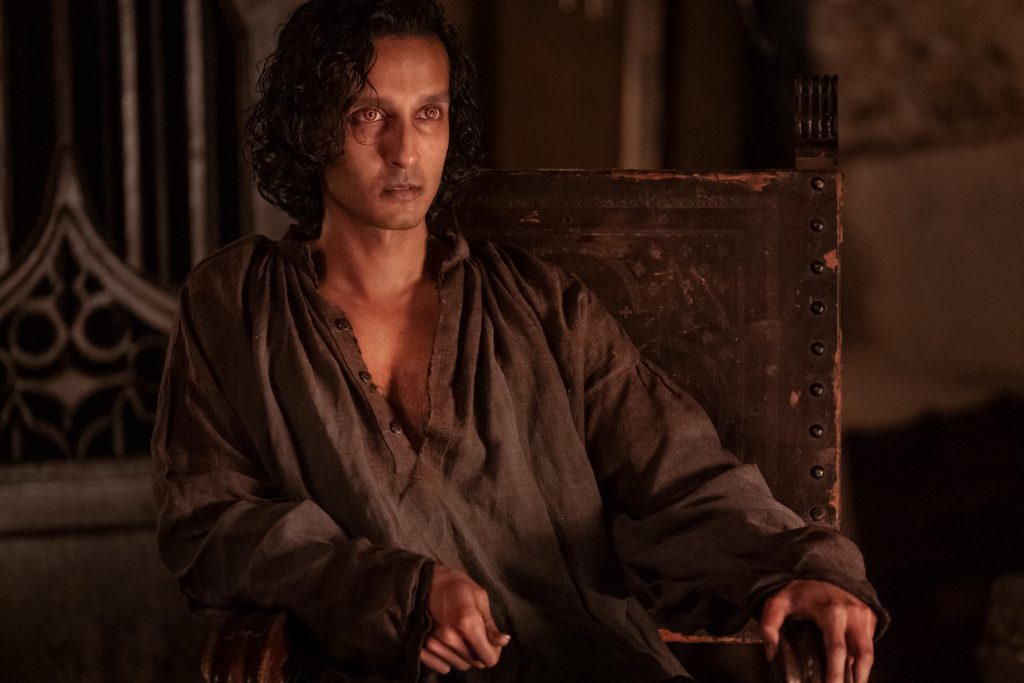
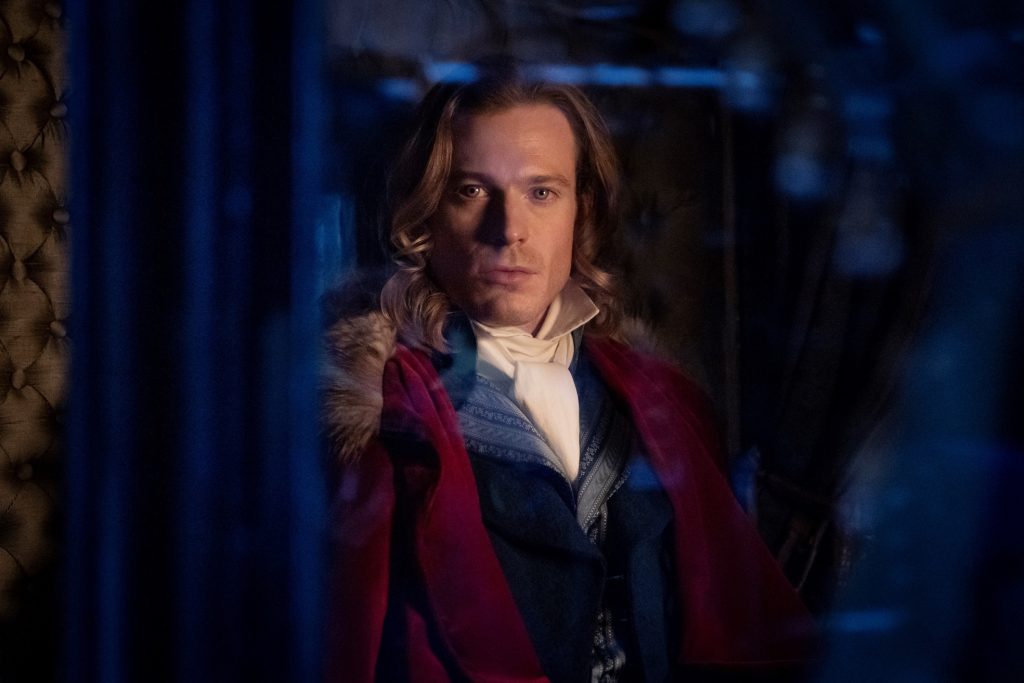
A luxury apartment covering an entire single floor of a high rise. Where the Vampire has granted the interview with the man he once judged to be unworthy. And where the journalist Daniel Molloy has hustled, for a second shot at the interview that got away from him 40 years earlier…
Based on Anne Rice’s iconic novel, Interview with The Vampire follows Louis’ epic story of love, blood and the perils of immortality, as told to the journalist Daniel Molloy. Chafing at the limitations of life as a black man in 1900’s New Orleans, Louis finds it impossible to resist Lestat’s offer of the ultimate escape: joining him as his vampire companion.
But Louis’s intoxicating new powers come with a violent price, and the introduction of Lestat’s newest fledgling, the child vampire Claudia, soon sets them on a decades-long path of revenge and atonement. A sensuous, contemporary reinvention of Anne Rice’s revolutionary gothic novel.
Anne Rice’s Interview with the Vampire Season 2 premiers in 2024.
Orphan Black: Echoes
Set in the near future, Orphan Black: Echoes takes a deep dive into the exploration of the scientific manipulation of human existence. It follows a group of women as they weave their way into each other’s lives and embark on a thrilling journey, unravelling the mystery of their identity and uncovering a wrenching story of love and betrayal.
The series stars Krysten Ritter, Keeley Hawes, Amanda Fix, Avan Jogia, Rya Kihlstedt and James Hiroyuki Liao, and is executive produced by showrunner/creator Anna Fishko, director John Fawcett, Krysten Ritter and Boat Rocker’s David Fortier, Ivan Schneeberg, Nick Nantell, Kerry Appleyard and Katie O’Connell Marsh.




